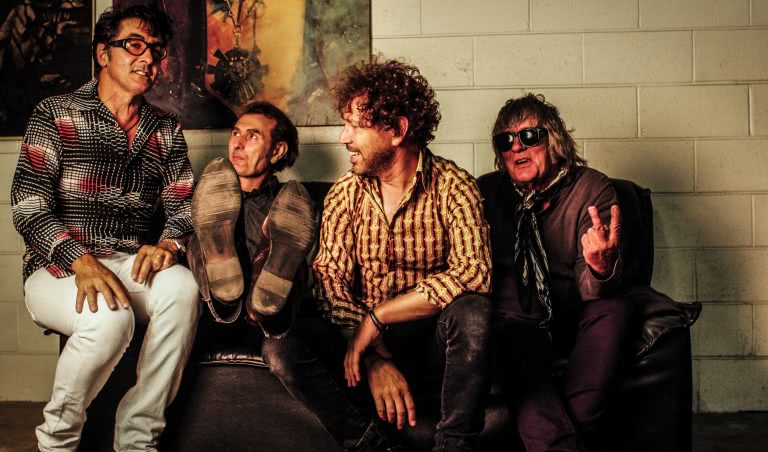A simplified account of the Australian punk movement will suggest it comprised The Saints and Radio Birdman and that was essentially it, until post-punk and new wave took over in the early ’80s. However, punk rock didn’t just strike in the eastern states. ‘Frantic Romantic’, the 1979 debut single from Perth’s The Scientists, is an unkempt gut-punch that’s as vital and memorable as contemporaneous work by Buzzcocks or Ramones.
“There was a certain primitivism that went with it – primitive-ism, as opposed to just being primitive,” says founding Scientists vocalist and guitarist Kim Salmon. “The bands that we admired always were bands that had a huge amount of minimalism, like Ramones or The Cramps or The Stooges. They were bands about primal urges and sounds. That was something that always marked The Scientists’ approach.”
It’s now roughly 35 years since the formation of The Scientists’ original lineup, which also featured drummer James Baker, guitarist Roddy Radalj and bassist Boris Sujdovic. The foursome quickly congealed and wrote a stack of enduring songs but they broke apart before ever recording anything together (Sujdovic had left the band by the time ‘Frantic Romantic’ arrived). However, they’ve regrouped at long last for a 35th anniversary tour this month.
“We’ve got enough [songs] for a set, basically,” Salmon explains. “That was what we had. We wrote a lot when we first started. We wrote a shitload, actually. We’re going to claim what was ours.”
It might have taken 35 years to get back together under the Scientists banner but the band members hardly kept quiet in the intervening years. In 1981 Baker and Radalj helped to form the Hoodoo Gurus (then known as Le Hoodoo Gurus) and in 1983 Salmon, Sujdovic and Baker all reunited (next to Tex Perkins and Spencer P. Jones) in Beasts of Bourbon. The seed for this upcoming tour was planted during the Beasts’ 30th anniversary tour last year.
“It was just an idea that Boris had when I was with him and James doing the Beasts of Bourbon thing,” Salmon says. “It occurred to Boris that we were just one member shy of the original Scientists – why not get Rod involved in it?”
While the others had gone off to focus on other projects during the ’80s, Salmon carried on using The Scientists name for nearly ten years; releasing five LPs with an ever-changing list of band members and making several sound revisions. In fact, he’s never been content inhabiting any one songwriting guise for too long.
“I’ve always been that way. The Scientists, we used to be shocking about that. In the [1982 single] ‘Swampland’ days – people would complain back then that we didn’t play ‘Swampland’. It’s nice when, just for the sake of vanity, people are interested in what you’re doing these days, because it’s much more interesting exploring new ideas.”
Salmon is someone who has never been short of ideas. When The Scientists called it a day in 1987 he promptly initiated the Kim Salmon and the Surrealists project. He’s also been integral to four Beasts of Bourbon records and, more recently, teamed up with Died Pretty vocalist Ron Peno in The Darling Downs and made records with members of Dirty Three and Spencer P. Jones. Salmon is a widely respected songwriter, but his career has experienced no obvious commercial peak.
“After a period of time it becomes old enough for people to like,” he says. “For instance, it was hard to get people interested in [the Surrealists] after The Scientists, but after about ten years [1993’s] Sin Factory is an album that people really look back at.”
Even if massive financial accolades aren’t coming your way, that’s no reason to stop writing songs. Salmon remains unendingly prolific, but the reunions of the last few years show that he’s now also willing to dip into his back catalogue.
“I’ve been really good in the last decade. I’ve played Beasts of Bourbon songs and Scientists songs. I just thought, ‘Well, that’s what they want,’ and now I’m grateful that people are actually interested in that stuff.”
Even though Salmon is finally comfortable revisiting the music written by his younger self, the vast diversity of his catalogue and his hitherto refusal to draw from the past might mean there’s an insurmountable distance between him and these earlier creations.
“In some ways I’m a very different person but in other ways I’ve got the same basic motivations,” he says. “I’ve looked to make music that excites me and other people. It could be it excites people in a very physical way, or it could be in an intellectual way, or it could be just emotional. That is what I think I’ve always wanted to do. I’m not making relaxation tapes or meditations. I do definitely want to move people.”
And, accordingly, getting people excited is exactly what The Scientists’ original incarnation excelled at.
“That lineup was the most rockin’ of all lineups of all bands I’ve ever been in – I can say that. So it’s just a chance to rock. It actually literally was the most primitive. We had pop chord structures and things going on, so it was more the delivery that was primitive. We weren’t really virtuoso players, so consequently there was a lot of anarchy in the sound.”
See The Scientists at Factory Theatre on Friday March 28.


































